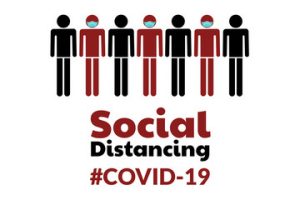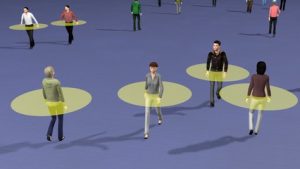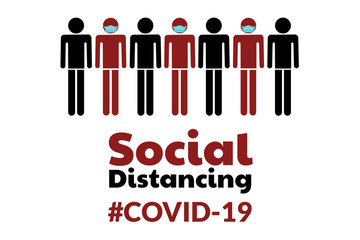With the coronavirus spreading quickly across the globe, governments the world over have started urging their citizens to maintain social distances to curb the spread of the coronavirus.
Social distancing is one of the most popular tools recommended for the prevention of coronavirus. If done effectively, experts believe social distancing could bring an end to the pandemic in the nearest future.
So, in this guide, we’ll be looking at what social distancing is, how it works to keep you safe from the coronavirus, and how you can do it effectively.
What is social distancing?

Social distancing involves maintaining reasonable space between yourself and every other person when you are in meeting with other people or social gathering.
The recommended distance for active social distancing is 6 ft – about the length of one human body when you are meeting friends, family members or in any public gathering, it’s recommended that you keep a minimum distance of 6ft between yourself and every other person in the area.
That process is called social distancing. Social distancing, however, goes beyond maintaining a reasonable distance between yourself and every other person you meet. It also involves avoiding handshakes, using hand sanitizers, avoiding large gatherings, covering your nose when you sneeze, and so on.
How Social Distancing can help prevent the spread of Coronavirus

How Social Distancing helps prevent the Spread of Coronavirus
The coronavirus is an airborne disease. Unlike other typical airborne diseases, however, the coronavirus cannot travel very far in the air.
When an infected person coughs, they release coronavirus into the air around them in the sputum that comes out of their mouth and nostrils. Those standing nearby can easily breathe in the virus and in turn get infected with the SARS-COV-2.
The coronavirus, however, cannot travel very far in the air. If we can maintain sufficient distance between ourselves and other people, then we can safely prevent the transmission of the virus.
Social distancing is recommended for everyone, and you shouldn’t wait for others to show symptoms of the COVID-19 before distancing yourself from them. This is because when a person is newly infected with the coronavirus, they can stay healthy for 2 to 14 days without showing any symptoms.
The period between the infection and the manifestation is called the incubation period. People in the incubation period can still spread the virus to other people, even when they are not showing any symptoms.
Some people are also asymptotic – they do not show any symptoms of the disease even when they are already infected. Maintaining social distance in a relatively healthy crowd or home is an essential preventive measure to keep yourself safe from the coronavirus.
How to Practice Social Distancing
Here are some helpful tips on how to practice social distancing and prevent the spread of Coronavirus:
1. Avoid large gathering
One of the recommended ways to keep yourself socially distant from others is to avoid large crowds like church, sports centres, mosques, markets etc.
In large gatherings, it is harder for you to keep the distance between yourself and other people. At the same time, your chances of meeting with an infected person will increase significantly as the number of people you meet per time increases.
Governments the world over have recommended that all sizable social gathering should be suspended while the coronavirus lasts. By keeping the number of people that meet at a time low, the spread of the coronavirus will be significantly reduced, and fewer people will be infected per time.
2. Keep a minimum of 6 feet distance when meeting with people
While meeting people in public, you should maintain a minimum distance of 6 ft from everyone else.
6ft is about the height of the human body. You don’t have to measure it every time as you can easily visualize your height on the floor and keep the distance from the next person. A distance tape can be used to achieve this.
The 6ft minimum distance is recommended because the sputum containing the coronavirus when an infected person sneezes hardly travels beyond 6ft. This does not mean that you cannot be infected when you maintain such distances – it’ll only reduce the chances of infection to the barest almost impossible chances.
3. Avoid handshakes
The coronavirus can also be transmitted via handshake. This could occur when an infected person’s hand comes in contact with the sputum, and you get to shake the same hands. This could, in turn, be transferred into your body when you use the same hands to touch your face or even eat with it.
To keep yourself safe, you may want to avoid handshake at this point and make use of other accepted social greeting format like foot bumps, bowing to one another, elbow bump and so on. You may also want to make sure you wash your hands regularly, especially after handling banknotes or coming into your home from the public.
4. Work from home
If you can, you may want to start working from home. When you go to work, you are bound to meet with more people who can significantly increase your chances of coming in contact with the virus.
5. Don’t visit adults who are over 60 years
COVID-19 is highly fatal for adults of 60 years and above. As such, you may want to avoid visiting them for the time being and even encourage them to limit their social contact with others.
As the world races to find an effective cure for COVID-19, social distancing might be the only effective tool to keep yourself and family safe for the time being and help curb the spread of the coronavirus.








